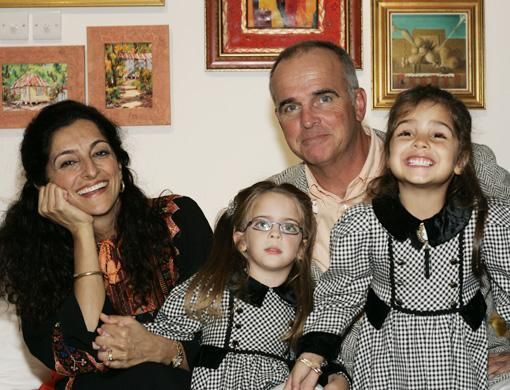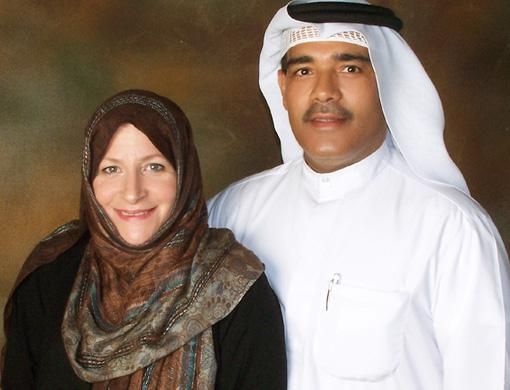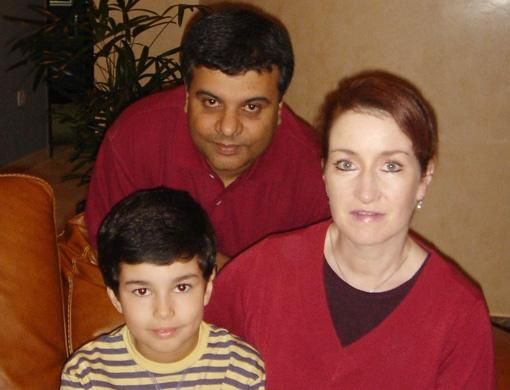With a large expatriate populace in Dubai, it is not uncommon to see mixed marriages in the city. However, not all these marriages enjoy smooth sailing. Manal Alafrangi analyses the phenomenon
Dubai is home to expatriates from nearly 200 countries. As a result, the city has its fair share of mixed couples strolling through its malls.
Without much searching, one can find pairings of Arab and Westerner, Asian and Arab or Asian and Westerner. Also, in the Arab community there are mixed relationships from different regions: the Levant, Gulf and North Africa.
In Dubai, the number of UAE nationals married to foreigners is sizeable. In fact, between 2001 and 2005, 17 per cent of all Emirati marriages were mixed, according to Dubai Municipality.
The image these mixed couples paint is a positive one. Intercultural marriages appear blissful, an exciting thing to be a part of. For those not involved, however, they remain a mystery.
One wonders how often cultural misunderstandings occur in such relationships. How are their children brought up? Which religion (if spouses have different religions) dominates? What languages are spoken in these households? Are they accepted by both families and both societies? And, perhaps most interestingly, does the heart take control of the brain in such matches - or is it the other way round?
Like all relationships, intercultural marriages have hurdles to face and overcome. The question remains, however: do husband and wife face additional barriers because of their different backgrounds?
After talking to five people in mixed marriages, the consensus seems to be that the key to a successful relationship is communication and respect. This proves to be both intellectually and spiritually rewarding.
Furthermore, the notion that intercultural marriages never work because one culture perceives itself as superior to the other is shattered by the people interviewed.
Needless to say, mixed marriages are subject to all kinds of pressures, both internal and societal. These couples are also often challenged by family, friends and the general public. If allowed, the prejudice of others could compromise the union and that is why many find that solid family support is important.
Of the people Friday interviewed, each had a unique story to tell. Not all were success stories.
Mixed marriages are a global trend; they are not exclusive to a particular country or region. Moreover, it is a matter of personal choice and is oblivious to religion, nationality or skin colour.
Perhaps because of the cosmopolitan and multicultural nature of Dubai, this type of union is easily observed here. Here are five personal accounts:
"I just looked up and knew that it was him"
Dr Houriya Kazim, UAE national, who has been married to an American for 8 years
My husband, Ron, and I met in Sharjah. He was based there as a journalist and happened to like cricket and I love cricket. During those days, cricket in Sharjah was a big social event.
We started talking because we shared an interest in Afghanistan. I always wanted to go (and) work there to save the women. He'd just come back from there.
Shortly after, I went back to England for my postgraduate work and he was in and out of Bosnia doing coverage. That's why we had a long engagement.
I've been very lucky because my parents are who they are. They are liberal in the sense that they never insist I covered up while growing up.
They would say the typical thing to us: you have to marry your own kind or at least a Muslim. That's what you think in your head. I was always looking for something I (would feel) immediately.
Literally, Ron walked into the room and it was an immediate thing for both of us - without saying a word. We were at two opposite ends of the room and I just looked up and knew that it was him.
My dad was pretty cool. He got to the point where he realised that I was brought up in different places (the Caribbean, Canada and Ireland) and saw that when you come back, you think differently. He mellowed and said it was my choice and that he'd always show support.
My mum was probably the one who had the most problems with it, but this was more a personality thing, not (based on) colour or race.
Ron was based in Iran before he came to Dubai and the Iranian revolution made him wonder about Islam. When I met him, he was already in the process of embracing Islam. It was good for me because my own choice would be to marry a Muslim as well.
After me, a couple of my cousins did (likewise). I had great aunts say to me: "Look what you've done." Even to this day, people still see him as an outsider.
For example, when I get wedding invitations he is very rarely invited because they don't see him as part of the same group as me, my father and my brother. He doesn't mind but it does make me feel that perhaps they don't think he is (a) part of our community.
In my family, mixed marriages are common. My younger brother is married to a Korean-American and my sister is married to a Swedish- American. Are these isolated cases?
I don't actually think about it. I think of me and my husband as two individuals who are married. I think my husband gets it all the time, when he says he is married to an Emirati. People react.
Being in a mixed relationship has taught me racial and religious tolerance and acceptance. I feel it's OK to celebrate differences and still maintain (one's) individuality.
I find here that a lot of people are so concerned because they feel they are losing their culture or religious identity. Just because you can be around everything else it doesn't mean you lose it. If you're comfortable with it and strong with it you won't.
I don't see any disadvantages to being in a mixed relationship. Communication, which is very important, is a personal, not cultural, thing. You just have to know your partner.
We tend to balance each other when it comes to raising our two daughters. He is more of a disciplinarian than I am. But we alternate between good guy bad guy.
I don't know if people judge me. They might but honestly, I am not bothered.
In terms of acceptance in Dubai, I think Emirati men have it easier. It's still a difficult one for our parents who still don't want to see this happening to their daughters. Emiratis still push for inter-marriage and there's nothing wrong with that.
I am very happy. I have no regrets at all. The most important thing is communication and also respect.
"I felt very comfortable connecting him to my family"
Sharla Musabi, American, been married to a UAE national for over 20 years
I met my husband, Hasan, when he came to Seattle, Washington, to study in 1977. He was 17. At the time, when he said he was from Dubai, I didn't recognise it. Early on, he told me Islam means we pray directly to God - a relationship without anything in between.
I thought to myself: this is for me. So at 18, when he spoke of Islam, I felt connected. I thought: there is a name to something I believe in. So we had this bond immediately.
Two weeks after meeting, we talked marriage. I was attracted to him the minute I sat with him. He had such hospitality; he was so polite and worried about the prayer timings. I could tell there was something very special about him.
I felt very comfortable connecting him to my family. We sat with my parents and we spoke about it. My family wasn't worried or scared whereas I had some anxiety. We got married two years later (my mum made it a requirement that we had a long engagement).
My mother gave me advice: "You cannot be imposing or arrogant; you are the one who will have to adjust. Make that commitment."
My saving grace is that his family understands Islam properly.
My marriage is solid. This is because Hasan was very respectful of all of the changes I had to go through, he was patient and never demanding. He could see the support I was getting from my family, so he wasn't going to mess that up.
He had some pressure from some of the distant relatives. Some were offended and they made my life quite difficult. This was when I first arrived - many years ago. I always knew that I had the support of his family and his elder brother.
I think I was a Muslim my whole life. It was about learning the practicalities of it. The advantage of being in a mixed relationship is that it breaks down barriers.
God created the universe without borders. We were meant to travel around the globe and learn about one another, without arrogance. As far as the relationship is concerned, there are no disadvantages.
I believe when a man and a woman have respect for one another, things turn out OK. Hasan respects what my struggles are and that validates me. And I respect what he goes through. He believes in me and I believe in him. As far as my children are concerned, I decided early on we really needed a united front.
The Emirati culture is dominant in my household. This was agreed upon from the beginning. We had very good communication and agreed on everything to do with the children. He never said: "There's the kids - raise them." He agreed to speak Arabic only and me English only.
People definitely judge me.
I think many people in Dubai are basically walking around with the wrong impression about each and every group here and they don't cross over enough to get to know one another. I have had a few experiences in the past, where someone would say to me: "Are you a second wife or did you marry your husband for his money?"
Overall, I am accepted as an Emirati with a smile. I don't let what might have happened 20 years ago contradict that. I am no different, except that there's this cheeky smile on people's faces because I speak Arabic. I never feel isolated here. I don't choose to be a victim. I take control of every situation.
I advocate intercultural marriages and I think respect is the key to having a successful marriage and country.
"The barriers started coming up"
Polish woman, in the process of getting a divorce from a UAE national; was married to him for over 20 years
I met my husband in Poland. He came to my country several times.
Back then, I didn't know much about the UAE. Within three years of meeting him, I got married. During the fourth year (in 1989), I came to Dubai to see what it was like. I found it very much European.
My husband was very open-minded. He spoke very good English. He was also friendly.
My family liked him, he touched our hearts. I met him at the same time around when my father passed away. Looking back, I don't think I was thinking very clearly. My mother wasn't happy about my marriage. She was worried I would be far away; she didn't know much about the country either.
From his side, I didn't know what his family thought. Even when I got married and moved to Dubai, he kept me away from his family. He also didn't want me to work.
In the beginning, we had a good friendship. When he started to socialise with his friends, I noticed a barrier. They were talking in a different way ... they were very cold and almost official.
I don't speak Arabic and they often spoke in Arabic. Sometimes, my husband would tell me to leave the room when they visited.
The barriers increased. I eventually met the family but I was not accepted. Our married life faced problems; we had two separate rooms and therefore no intimacy. We had a distant married life.
I didn't have much contact with Arabic culture. I don't have Emirati friends. I have been living in confusion. My children went to Western schools.
My husband's mannerism changed immensely … his character changed after marriage. Language was a factor, as my English was very limited in the beginning. That's why I would have liked to work to improve it. He wanted me to stay at home or travel with him.
The advantage I see in marrying someone from a different background is learning new things about this place. I also embraced Islam.
The disadvantages centre on the change of culture. I think things would have been different if we lived on mutual grounds.
I know a mixed marriage can work out as along as there is openness and communication. Everything can be done if you want it. There must be some compromise, of course. I think I compromised too much given my background. I do regret this relationship. I wasn't looking for an easy marriage but a normal one.
"We are Happy"
Rafik Seedat, African-Asian British, married to a Scot for 17 years
I first met my wife, Margaret, in London 20 years ago. In 1990, we moved to Dubai for job opportunities. I had known her for five years before we got married. We were best friends. At first, I thought we'd be in Dubai for four to five years. We are still here today.
We had both weddings, the wedding according to Sharia law and the church wedding.
Initially, my family did not accept her at all and I was cut off (from my family) for years. They expected me to marry an Asian girl from the same community. I was the first person to marry outside of the family.
What's more, I was the eldest of my generation, so as far as my family was concerned I was setting a bad example. They objected to the marriage on religious grounds.
From a religious aspect, as far as I was concerned, I knew that I could marry a Christian as a Muslim man. I went to see an imam and he said there were no issues or problems with that as long as my children are Muslim.
That is the case today, we have an 8-year old (Adam) and we are both raising him as a Muslim.
I would like my son to be a better Muslim than I am. Margaret spends more time on my son's Islamic studies than I do. She is keen for him to be a Muslim.
As for my wife ... she knows the religion (being in Dubai and having so many friends) and if she wants to embrace Islam, I welcome it. It is a very personal matter. I will never interfere with her faith.
Her family was fine with us. They had absolutely no problem with it. Incidentally, she was the first person to marry a non-white. We went and visited them in Scotland after we got married.
My family came to visit us a year after we got married; they realised it was a done thing. Within days of the visit, I was given their blessings. Now they come once or twice a year. They fully accept my marriage, even more so with the grandson around.
I came to Dubai to work and have a better standard of living. Seventeen years ago, people lived in their own separate societies and I had a problem with that because I couldn't define myself in any category (British or Asian).
For me, it didn't matter who my friends were. I think this applies today - even with the newcomers.
Seventeen years ago, things were different. Today, there are a lot of mixed relationships in Dubai.
If my marriage didn't work, it would be purely out of the fact that we didn't get along - not because of cultural and religious reasons.
There are advantages to being in a mixed relationship. For my son, he is growing up with two very old and distinct cultures, Asian and Scottish. He is getting the best of both worlds.
The same goes for me and (my wife) as well. Because we come from different societies, there are a lot of differences to keep the marriage very strong. We have a lot to talk about.
The flip side is you can have children who grow up not knowing where they stand in terms of religion, culture or even skin colour. This identity issue is a worry.
There is also the issue of race. Generally, people still find it difficult to accept mixed marriages.
I find that people tend to be extremely judgmental. I've experienced it at clubs, for example, here in Dubai, where you have white-domain institutions. My wife would be accepted and I would not.
I believe people have to make compromises in order to move forward. There is no middle road in this. We are happy.





